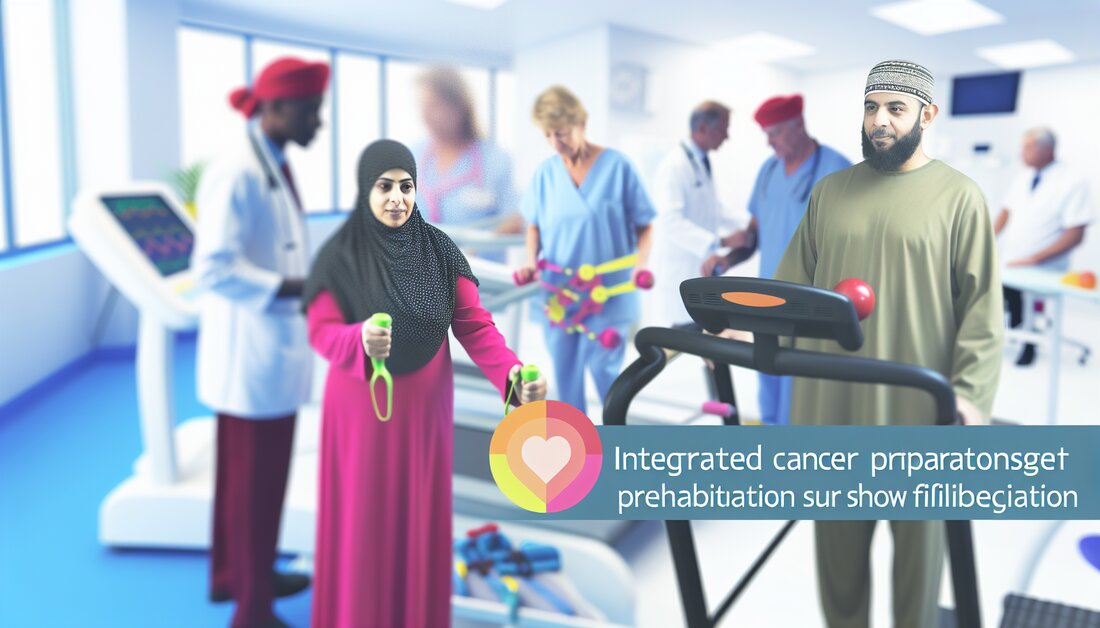Integrated cancer preparation: Prehabilitation before surgery shows feasibility
A pilot study examines the feasibility of prehabilitation in an integrative day hospital for cancer patients to reduce postoperative complications and improve clinical outcome.

Integrated cancer preparation: Prehabilitation before surgery shows feasibility
Dealing with cancer is a major burden for many patients, not only physically but also emotionally. The phase before an operation is particularly challenging when patients have already received chemotherapy or radiation therapy. These treatments can significantly impact quality of life. In such cases, the concept of “prehabilitation” can help. The aim is to prepare the patient's body and mind as best as possible for the upcoming operation and to reduce possible postoperative complications. Prehabilitation also offers the opportunity to support patients in adapting their lifestyle during this critical phase.
A current study examined the feasibility of such a prehabilitation program in an integrative medicine day clinic setting (PRIME-DC) at a large university hospital. The aim of the study was to determine whether 80% of participating patients were willing and able to attend at least six of eight weekly sessions, each lasting 6.5 hours. The study focuses on cancer patients who need neoadjuvant (preparatory) treatment, particularly for abdominal tumors or breast cancer.
The program includes various components: mind-body medicine, exercise therapy, nutritional therapy, naturopathic advice and the use of a yarrow liver wrap. The main objective of the study is patient presence during sessions, while secondary objectives include physical assessments, quality of life and management of side effects.
| type of cancer | Number of enrolled patients |
|---|---|
| Breast cancer | 18 |
| Other tumors | 5 |
Results obtained through February 2023 show that the majority of patients participate in the program and it is an integrative approach that combines prehabilitation and lifestyle modification. These protocols open up new perspectives for the treatment of cancer patients and could help to improve quality of life and treatment outcomes in the future.
Explanation of terms:
- Neoadjuvante Behandlung: Eine Therapie, die vor der Hauptbehandlung (wie einer Operation) erfolgt, um den Tumor zu verkleinern oder die Heilungschancen zu verbessern.
- Prähabilitation: Ein Konzept, bei dem Körper und Geist auf eine bevorstehende medizinische Behandlung, wie eine Operation, vorbereitet werden.
- Mind-Body-Medizin: Eine Therapieform, die die Verbindung zwischen Geist und Körper nutzt, um die Gesundheit zu fördern.
- Schafgarben-Leberwickel: Eine naturheilkundliche Anwendung, bei der ein Wickel mit der Heilpflanze Schafgarbe für die Leber eingesetzt wird.
Abbreviations:
- PRIME-DC: Programm der Prähabilitation in einer integrierten Medizin-Tagesklinik
- DRKS: Deutsches Register Klinischer Studien
- IRRID: International Registered Report Identifier
Feasibility of prehabilitation in cancer patients before surgery
The study examines the feasibility of an integrative multimodal prehabilitation program (PRIME-DC) for cancer patients at a large university hospital. The hypothesis is that such a program reduces postoperative distress and may improve clinical outcome.
Study background and concentration points
Cancer patients undergoing neoadjuvant treatment experience significant stress from chemotherapy and radiation therapy as well as upcoming surgery. The study aims to optimally prepare these patients for the surgical procedure through a holistic prehabilitation program that combines various approaches such as mind-body medicine, exercise therapy, nutritional advice and naturopathic therapy.
methodology
- Teilnehmer: Erwachsene Krebspatienten mit Primärtumoren im Abdomen oder in der Brust, die eine neoadjuvante onkologische Behandlung benötigen.
- Intervention: PRIME-DC umfasst eine Kombination aus Mind-Body-Intervention, Bewegungstherapie, Ernährungsberatung, Anwendung von Schafgarben-Leberwickeln und naturheilkundlicher Beratung.
- Primäre Endpunkte: Adhärenz zum Tagesklinikprogramm, definiert als Anwesenheit in mindestens 6 von 8 wöchentlichen Sitzungen.
- Sekundäre Endpunkte: Physische Bewertung, Lebensqualität und neoadjuvante behandlungsassoziierte Nebenwirkungen.
- Qualitative Daten: Semistrukturierte Interviews zu den Komponenten des Programms nach Abschluss.
Results
To date, 23 patients have been enrolled in the study protocol, with breast cancer being the dominant disease (18 patients). The feasibility of the program will be measured by whether 80% of patients successfully complete at least 6 of the 8 planned sessions.
Protocol conclusions
The protocol demonstrates the feasibility of an integrative prehabilitation approach that not only focuses on physical preparation but also incorporates lifestyle changes and naturopathic therapies. The aim is to address patients' unmet needs during the critical preoperative phase and thereby reduce postoperative complications.
| Cancer disease | Number of patients |
|---|---|
| Breast cancer | 18 |
| Abdominal cancers | 5 |
The study shows that a multimodal approach in the preoperative phase for cancer patients is possible and promising. Further research is needed to evaluate the long-term effects of this program on postoperative outcomes and quality of life.
Further information about the research can be found at the following link: https://pubmed.ncbi.nlm.nih.gov/37851493.

 Suche
Suche
 Mein Konto
Mein Konto
